Koch, Inc. is an American multinational conglomerate corporation based in Wichita, Kansas, and is the second-largest privately held company in the United States, after Cargill. Its subsidiaries are involved in the manufacturing, refining, and distribution of petroleum, chemicals, energy, fiber, intermediates and polymers, minerals, fertilizer, pulp and paper, chemical technology equipment, cloud computing, finance, raw materials trading, and investments. Koch owns Flint Hills Resources, Georgia-Pacific, Guardian Industries, Infor, Invista, KBX, Koch Ag & Energy Solutions, Koch Engineered Solutions, Koch Investments Group, Koch Minerals & Trading, and Molex. The firm employs 122,000 people in 60 countries, with about half of its business in the United States.
The Koch family foundations are a group of charitable foundations in the United States associated with the family of Fred C. Koch. The most prominent of these are the Charles Koch Foundation and the David H. Koch Charitable Foundation, created by Charles Koch and David Koch, two sons of Fred C. Koch who own the majority of Koch Industries, an oil, gas, paper, and chemical conglomerate which is the US's second-largest privately held company. Charles' and David's foundations have provided millions of dollars to a variety of organizations, including libertarian and conservative think tanks. Areas of funding include think tanks, political advocacy, climate change denial, higher education scholarships, cancer research, arts, and science.

David Hamilton Koch was an American businessman, political activist, philanthropist, and chemical engineer. In 1970, he joined the family business: Koch Industries, the second largest privately held company in the United States. He became president of the subsidiary Koch Engineering in 1979 and became a co-owner of Koch Industries in 1983. Koch served as an executive vice president of Koch Industries until he retired due to health issues in 2018.

S&P Global Inc. is an American publicly traded corporation headquartered in Manhattan, New York City. Its primary areas of business are financial information and analytics. It is the parent company of S&P Global Ratings, S&P Global Market Intelligence, S&P Global Mobility, S&P Global Sustainable1, and S&P Global Commodity Insights, CRISIL It is also the majority owner of the S&P Dow Jones Indices joint venture. "S&P" is a shortening of "Standard and Poor's".

Jane Meredith Mayer is an American investigative journalist who has been a staff writer for The New Yorker since 1995. She has written for the publication about money in politics; government prosecution of whistleblowers; the United States Predator drone program; Donald Trump's ghostwriter, Tony Schwartz; and Trump's financial backer, Robert Mercer. In 2016, Mayer's book Dark Money—in which she investigated the history of the conservative fundraising Koch brothers—was published to critical acclaim.
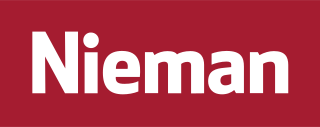
The Nieman Foundation for Journalism is the primary journalism institution at Harvard University.

Laurence Douglas Fink is an American billionaire businessman. He is a co-founder, chairman and CEO of BlackRock, an American multinational investment management corporation. BlackRock is the largest money-management firm in the world with more than US$10 trillion in assets under management. In April 2024, Fink's net worth was estimated at US$1.2 billion according to Forbes. He sits on the boards of the Council on Foreign Relations and the World Economic Forum.
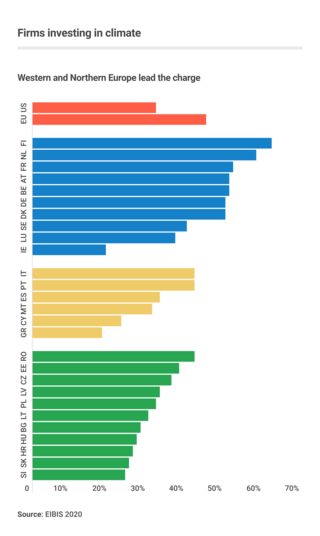
Business action on climate change is a topic which since 2000 includes a range of activities relating to climate change, and to influencing political decisions on climate change-related regulation, such as the Kyoto Protocol. Major multinationals have played and to some extent continue to play a significant role in the politics of climate change, especially in the United States, through lobbying of government and funding of climate change deniers. Business also plays a key role in the mitigation of climate change, through decisions to invest in researching and implementing new energy technologies and energy efficiency measures.
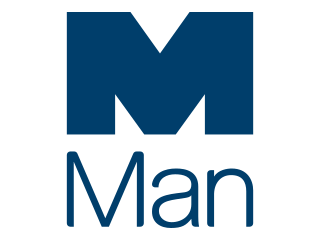
Man Group plc is an active investment management business listed on the London Stock Exchange. It provides investment funds in liquid and private markets for institutional and private investors. It is the world's largest publicly traded hedge fund company, reporting $178.2 billion in funds under management as of June 2024. The firm is headquartered at Riverbank House in London and employs over 1,800 people in various locations. The company was a sponsor of the Man Booker Prize from 2002 to 2019.

Fred Chase Koch was an American chemical engineer and entrepreneur who founded the oil refinery firm that later became Koch Industries, a privately held company which – under the principal ownership and leadership of Koch's sons Charles and David – would be listed by Forbes as the second-largest privately held company in the United States in 2015.
The Koch family is an American family engaged in business, best known for their political activities and their control of Koch Industries, the 2nd largest privately owned company in the United States. The family business was started by Fred C. Koch, who developed a new cracking method for the refinement of heavy crude oil into gasoline. Fred's four sons litigated against each other over their interests in the business during the 1980s and 1990s.
IIFL Finance Limited d/b/a IIFL and India Infoline Finance Limited, is an Indian diversified financial services company headquartered in Mumbai. The organisation was founded by Nirmal Jain. IIFL and its group companies are backed by Canadian investor Prem Watsa, private equity firm General Atlantic and CDC Group, the UK Government's private equity arm. IIFL is ranked among the top seven financial conglomerates in India and as the top independent financial services firm in India in terms of market capitalisation. Nirmal Jain is the chairman of the group, while R Venkataraman is the group managing director and co-promoter.
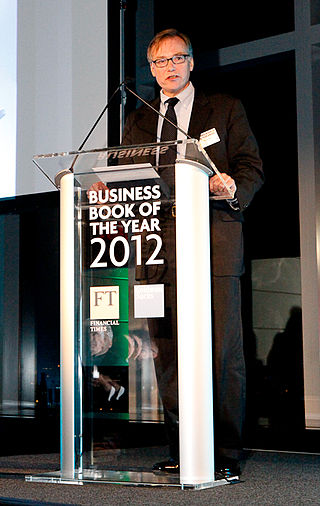
Financial Times Business Book of the Year Award is an annual award given to the best business book of the year as determined by the Financial Times. It aims to find the book that has "the most compelling and enjoyable insight into modern business issues". The award was established in 2005 and is worth £30,000. Beginning in 2010, five short-listed authors each receive £10,000, previously it was £5,000.
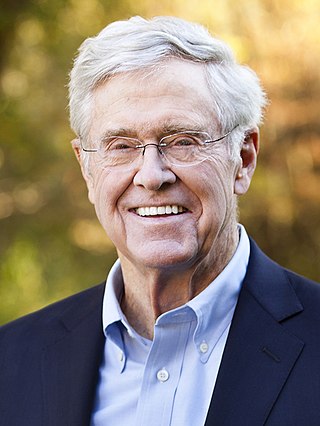
Charles G. and David H. Koch (1940–2019), sometimes referred to as the Koch brothers, have become famous for their financial and political influence in United States politics with a libertarian political stance, more specifically the right-libertarian branch most commonly found in American-style libertarianism. From around 2004 to 2019, with "foresight and perseverance", the brothers organized like-minded wealthy libertarian-oriented conservatives, spent hundreds of millions of dollars of their own money to build an "integrated" and "stealth" network of think tanks, foundations, "grassroots" movements, academic programs, advocacy and legal groups to "destroy the prevalent statist paradigm", and reshape public opinion to favor minimal government. As of mid 2018, the media has been encouraged to refer to the "Koch network" rather than the "Koch brothers".

Charles de Ganahl Koch is an American billionaire businessman. As of February 2024, he was ranked as the 23rd richest man in the world on the Bloomberg Billionaires Index, with an estimated net worth of $64.9 billion. Koch has been co-owner, chairman, and chief executive officer of Koch Industries since 1967, while his late brother David Koch served as executive vice president. Charles and David each owned 42% of the conglomerate. The brothers inherited the business from their father, Fred C. Koch, then expanded the business. Koch Industries is the largest privately held company by revenue in the United States, according to Forbes.
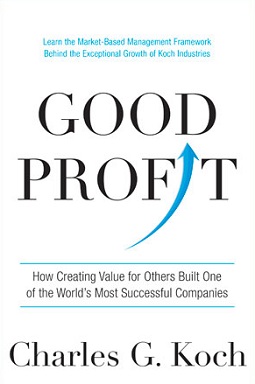
Good Profit: How Creating Value for Others Built One of the World's Most Successful Companies is a 2015 book by Charles G. Koch. It was published in the United States by Crown Business, an imprint of the Crown Publishing Group, a division of Penguin Random House LLC. It was published in the United Kingdom by Piatkus.
Canada's National Observer (CNO) is a news website that features daily news, analysis and opinion on energy, climate, politics, and social issues. By 2015, CNO had a Vancouver office and later opened offices in Ottawa and Toronto.
Charles Chase Koch, is an American businessman and the son of Charles Koch, the co-owner, CEO, and chairman of Koch Industries. Koch directs the venture capital company Koch Disruptive Technologies, and is a leading figure in Koch Industries and the family's philanthropic activities.
The Gerald Loeb Award is given annually for multiple categories of business reporting. The "Magazine" category is one of the two original categories awarded in 1958, with the last award given in 2014. The category included articles published the prior year in national and regional periodicals until 2008, when it was expanded to include magazine supplements to newspapers. Previously, newspaper magazine supplements were entered into an appropriate newspaper category. The "Magazine" and "Large Newspaper" categories were replaced by the "Feature" category in 2015.

Christopher Leonard is an American investigative journalist. He has written three books, The Meat Racket: The Secret Takeover of America's Food Business, the New York Times best-selling Kochland: The Secret History of Koch Industries and Corporate Power in America, and The Lords of Easy Money: How the Federal Reserve Broke the American Economy. His work has appeared in The New York Times, The Wall Street Journal, Fortune, and Bloomberg Businessweek.












